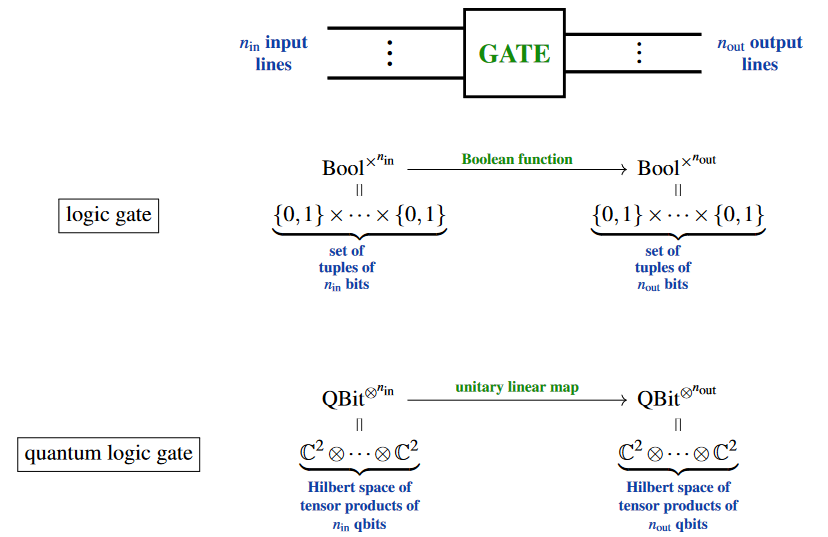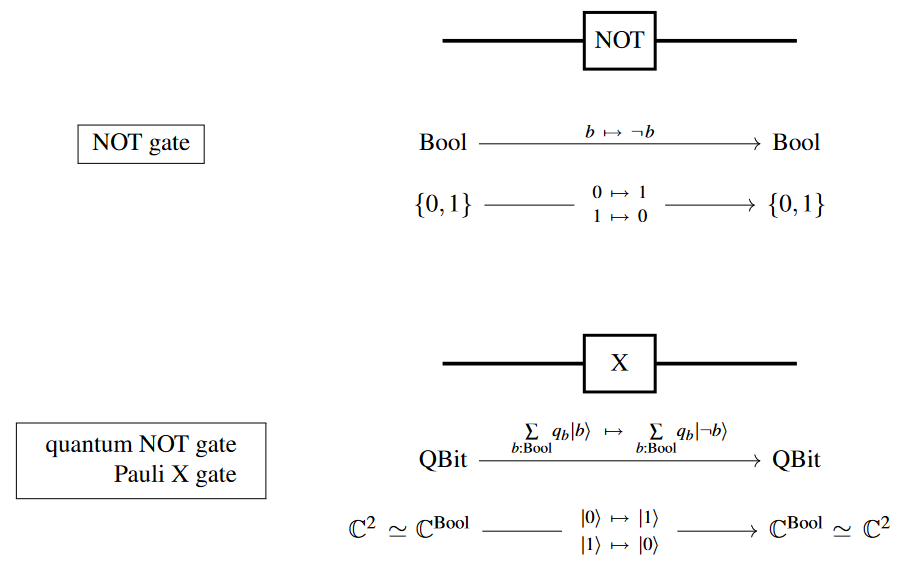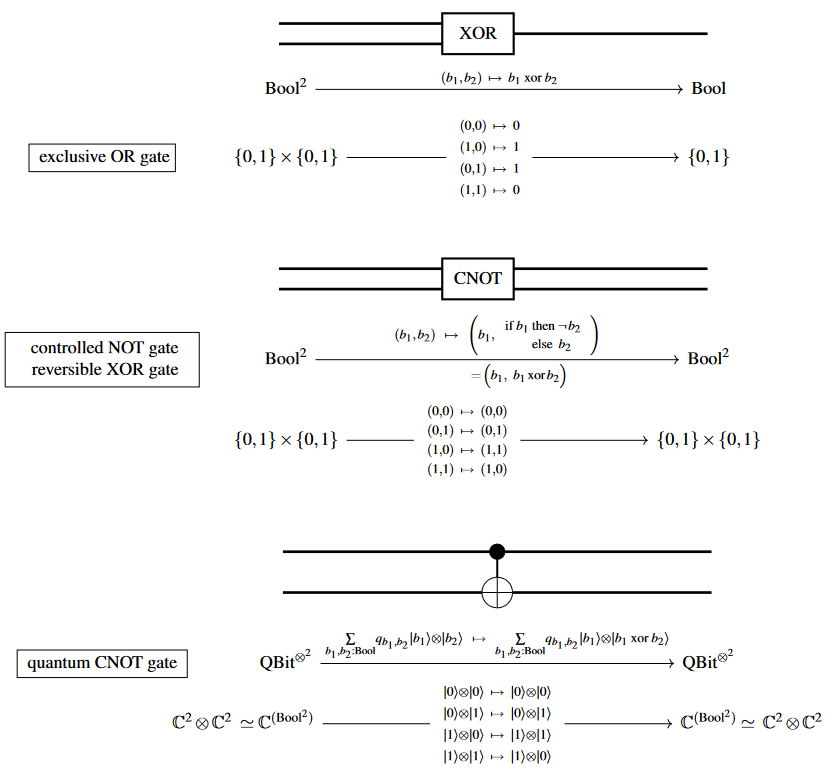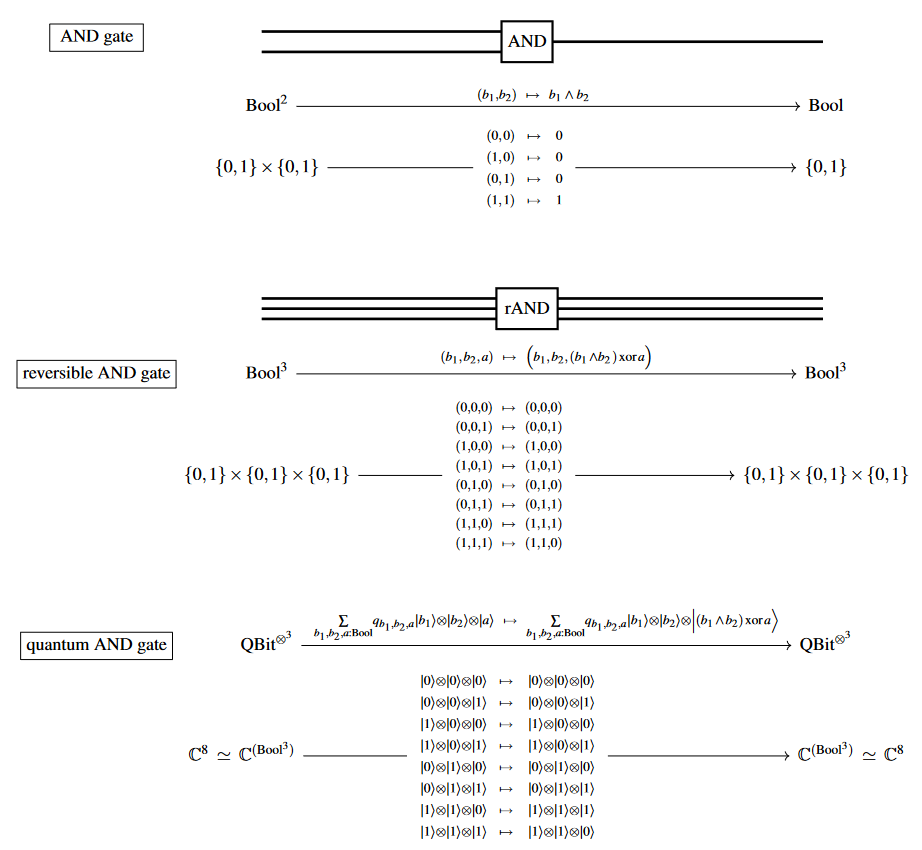nLab quantum logic gate
Context
Quantum systems
-
quantum algorithms:
Monoidal categories
With braiding
With duals for objects
-
category with duals (list of them)
-
dualizable object (what they have)
-
ribbon category, a.k.a. tortile category
With duals for morphisms
With traces
Closed structure
Special sorts of products
Semisimplicity
Morphisms
Internal monoids
Examples
Theorems
In higher category theory
Contents
Idea
Analogously to how a classical logic gate is a function between (finite) sets of tuples of bits (truth values), so a quantum logic gate is a (unitary) linear operator on (finite-dimensional) Hilbert spaces of tensor products of qbits:

Specifically, one calls such a linear map a quantum gate if it is thought of as potentially implemented as a basic operation performed by a quantum computing machine.
As such, typical quantum logic gates operate on a small number of qbits, with more complicated such linear maps obtained by composing a given set of quantum logic gates into quantum logic circuits. Such compilation is hence one model of quantum computation.
Examples
The first examples are linearizations of classical logic gates, or rather of their reversible versions:


AND:

The following examples have no classical analog:

Forther (types of) quantum gates:
Related concepts
References
General
The notion of quantum logic gates and quantum circuits originates with
-
Richard Feynman, Quantum mechanical computers, Foundations of Physics 16 (1986) 507–531 [doi:10.1007/BF01886518]
-
David E. Deutsch, Quantum computational networks, Proceedings of the Royal Society A, 425 1868 (1989) 73-90 [doi:10.1098/rspa.1989.0099, jstor:2398494]
-
Adriano Barenco, Charles H. Bennett, Richard Cleve, David P. DiVincenzo, Norman Margolus, Peter Shor, Tycho Sleator, John A. Smolin, Harald Weinfurter, Elementary gates for quantum computation, Phys. Rev. A52 (1995) 3457 [arXiv:quant-ph/9503016, doi:10.1103/PhysRevA.52.3457]
Monograph:
- Michael A. Nielsen, Isaac L. Chuang, §1.3.1-2 in: Quantum computation and quantum information, Cambridge University Press (2000) [doi:10.1017/CBO9780511976667, pdf, pdf]
On experimental realizations:
- Chen, Church, Englert, Henkel, Rohwedder, Scully, Zubairy: Quantum Computing Devices – Principles, Designs, and Analysis, Routledge (2007) [ISBN:9780367390372]
See also:
- Wikipedia, Quantum logic gate
Implementation of quantum logic gates on qbits realized via nucleon-spin, via pulse protocols in nuclear magnetic resonance-technology:
- Price, Somaroo, Tseng, Gore, Fahmy,, Havel, Cory: Construction and Implementation of NMR Quantum Logic Gates for Two Spin Systems, Journal of Magnetic Resonance 140 2 (1999) 371-378 [doi;10.1006/jmre.1999.1851]
and analogously on electron-spin:
- M. Yu. Volkov and K. M. Salikhov, Pulse Protocols for Quantum Computing with Electron Spins as Qubits, Appl Magn Reson 41 (2011) 145–154 [doi:10.1007/s00723-011-0297-2]
Universal gate sets
Review:
-
Universal set of quantum gates, ICTP-SAIFR presentation (2022) [pdf]
Criteria for universality:
-
Adam Sawicki, Katarzyna Karnas: Criteria for universality of quantum gates, Phys. Rev. A 95 062303 (2017) [arXiv:1610.00547, doi:10.1103/PhysRevA.95.062303]
-
Adam Sawicki, Lorenzo Mattioli, Zoltán Zimborás: Universality verification for a set of quantum gates (preprint title: How to check universality of quantum gates), Phys. Rev. A 105 (2022) 052602 [doi:10.1103/PhysRevA.105.052602, arXiv:2111.03862]
Proof that CNOT & U(2) is universal:
- Adriano Barenco, Charles H. Bennett, Richard Cleve, David P. DiVincenzo, Norman Margolus, Peter Shor, Tycho Sleator, John A. Smolin, Harald Weinfurter: Elementary gates for quantum computation, Phys. Rev. A 52 (1995) 3457 [doi:10.1103/PhysRevA.52.3457, arXiv:quant-ph/9503016]
Proof that CNOT & Hadamard & T gate is universal:
-
P. Oscar Boykin, Tal Mor, Matthew Pulver, Vwani Roychowdhury, Farrokh Vatan: On Universal and Fault-Tolerant Quantum Computing: A Novel Basis and a New Constructive Proof of Universality for Shor’s Basis, in 40th Annual Symposium on Foundations of Computer Science (1999) [arXiv:quant-ph/9906054, doi:10.1109/SFFCS.1999.814621]
-
P. Oscar Boykin, Tal Mor, Matthew Pulver, Vwani Roychowdhury, Farrokh Vatan: A new universal and fault-tolerant quantum basis, Information Processing Letters 75 3 (2000) 101-107 [doi:10.1016/S0020-0190(00)00084-3, inSpire:2725200]
Proof that CNOT & & S gate is universal:
- Alexei Kitaev: Quantum computations: algorithms and error correction, Russ. Math. Surv. 52 (1997) 1191 [doi:10.1070/RM1997v052n06ABEH002155]
Proof that Toffoli gate & Hadamard gate is universal (and generally Toffoli & any real single-qbit gate not preserving the measurement basis):
-
Yaoyun Shi: Both Toffoli and Controlled-NOT need little help to do universal quantum computation, Quantum Information & Computation 3 1 (2003) 84-92 [doi:10.5555/2011508.2011515, arXiv:quant-ph/0205115]
-
Dorit Aharonov: A Simple Proof that Toffoli and Hadamard are Quantum Universal [arXiv:quant-ph/0301040, spire:2727250]
Proof that Hadamard gate & is universal for single-qbit gates:
- Google AI quantum et al., VII F.2 (p 30) in: Supplementary information for “Quantum supremacy using a programmable superconducting processor”, Nature, 574 (2019) 505 [arXiv:1910.11333, doi:10.1038/s41586-019-1666-5]
Last revised on April 9, 2025 at 12:15:28. See the history of this page for a list of all contributions to it.